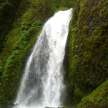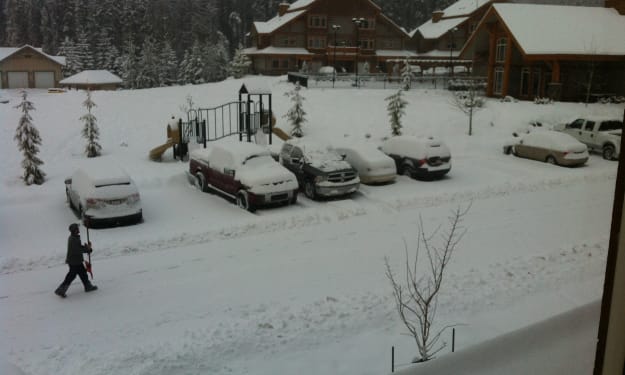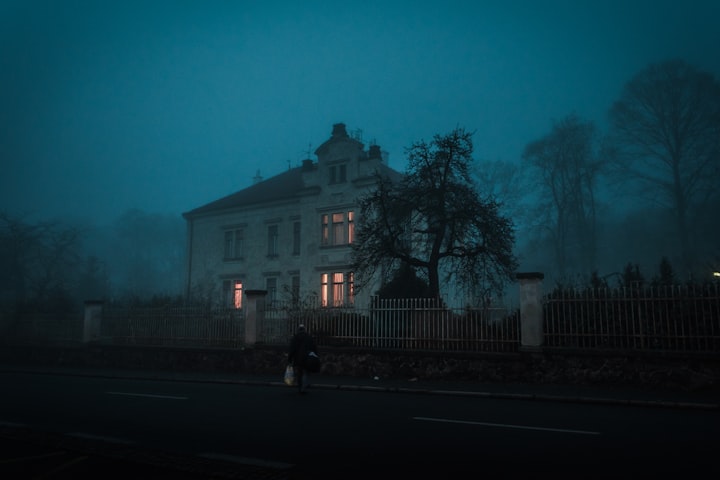An early Autumn morning
The stars at a glance

Before the first rays of sun rise above the horizon in the distance, I have left the front door of my home, and begin treading through the cover of the night. At this hour, with not a soul in sight — not even the birds chirping to an old-fashioned, 'good morning’— I’m left alone with just the sound of my thoughts, which drown out all other noise...
Yet, I’ve grown accustomed to the sounds coming from the nearby railroad track at the end of the cordoned-off road; where the rail cars pass and rumble throughout the night. It’s a continuous rumble, day and night, as sure and steady as the autumn leaves change colour with the approach of winter. Here, the leaves never fail to rustle with the slightest gust of autumn wind. And at this hour of the morning, it’s enough to chill you to the very core of your soul.
You lift the fork latch for the gate in the garden, and the gate creaks as you exit from your property — but you lazily let go of the latch too soon, on your way, and it drops down with a clang. You cringe — and for just a moment, you freeze — and look up to see if, perhaps, the noise woke the neighbours. The darkness, set within the big windows, remains unchanged; so you saunter on, without a single witness.
A lone leaf scrapes along the asphalt road and crosses your path. Another sudden wind gust threatens winter's arrival, and the leaf disappears into a pile like all the others. Still, the rumbling from the rail cars carries on; a monotonous groaning as if the very depths of the earth were about to cleave open, and the bowels of the earth were to spill forth. It carries on until a series of abrupt crashes finally puts a halt to the noise — indicating that the boxcars have reached their final destination, just beyond the bridge. The vibration is enough to rattle the old windows of your home, but over the years you barely notice anymore. The air is crisp and fresh as you make your way. The multicoloured leaves collect in all the alcoves, and along the fences; and along the curbs and gutters; and especially in the wells of every tree in the neighbourhood. Some leaves, too stubborn to heed the force of the wind, remain directly in your path; and whilst you trek down the road, you crunch and wade through them, in tandem.
After some time the clanging of the boxcars begins anew. Of course, the noise is great lengths behind you now, but nonetheless, you hear the rail cars creep forward again, slowly, like a funeral procession. You look up into the sky and discover the bareness of the branches that overhang on either side of the asphalt road, like a tunnel. The ash and elm trees that line the neighbourhood are now naked, and this permits for an excellent view of the night sky.
At times, the glare from the streetlights obscures the clarity of the stars, but you soon come upon an unlighted stretch of pavement — a chance occurrence, wherein you stop and gaze upon the brilliance of stars that make up the constellations. The Belt of Orion is the most easily recognizable star configuration; and you follow the stars of the Three Kings down in a line to find Sirius: the brightest star of them all. You’ve noted, from similar morning expeditions, that Orion has been rotating clockwise within the Celestial Sphere: where it had once appeared in the eastern night sky, it is now projecting south, or rather, southwest. Content with your discovery, you continue on, but you maintain your gaze across the left shoulder of 'the hunter,' at the point of the star of Betelguese: From its distinct red glow (which is a characteristic of the supergiant stars), you're now conscious of its impending death — whereupon, the explosion will light up the sky to the magnitude of a half-moon, for perhaps a full years' time.
Yet, your gaze now shifts slightly to your left and it rests upon the bright stars of Castor and Pollux, in the constellation of Gemini — Pollux being slightly brighter, and nearer to the sun. When taken together, they are the twins in Greek and Roman mythology; and are known patrons of sailing and horsemanship. But, the narrow passage of the road (enclosed on either side by homes), obstructs the furthest reaches of your gaze, and you don’t see much else; at least for now...
On this very same journey, you've frequently caught sight of the planets too: Mars, Jupiter, and Saturn, with the unaided eye. And you know these planets may be lingering on the other side of the homes you pass on by. You trudge along, and when a break occurs between two homes you look again. You quickly find the Big Dipper in the eastern sky instead. Dubhe and Merak are as brilliant as ever, and you follow them straight as an arrow to find Polaris, the North Star (from the line drawn by these two stars, also known as the pointers). The Little Dipper is tougher to see and you strain upwards...
Alas, you trip coming off a curb and fall down on the bare, hard, pavement surface — as if you’ve fallen straight to Hades and skipped passing through the gates on your way down. You saw a bit of the Heavens, but you suddenly burned out like Betelgeuse. Now you're in Limbo, and the first transport vessel to whisk you to work arrives.
About the Creator
Delusions of Grandeur
Influencing a small group of bright minds with my kind of propaganda.






Comments
There are no comments for this story
Be the first to respond and start the conversation.